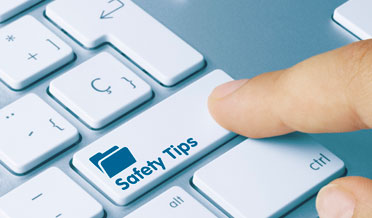Fire Safety Tips During Heating Season
Fire Safety Tips During Heating Season
As we enter late Fall and early Winter, the heating season is beginning in earnest. At Mullinix we care about the safety of our clients and offer some practical Fire Safety Tips During Heating Season to help protect your family and property.
Improperly used or poorly maintained heating equipment results in an annual average of 49,000 house fires:
- 500 people lose their lives and 1,350 people are injured every year
- The property loss exceeds $1.1B every year
- About half of these fires happen during December, January and February1
Please, take steps to reduce the risk of fire by following some important safety tips.
Be prepared with smoke and carbon monoxide (CO) detectors. Building codes require detectors on every level in new homes. If your home is not equipped with smoke and CO detectors, acquiring and installing them is a priority.
- Some fire stations give detectors away during the heating season—it is worth investigating. Smoke detectors are inexpensive; don’t hesitate. Detectors save lives every year.
- Smoke detectors should be installed in every bedroom or sleeping area.
- Smoke detectors cannot protect you if they cease to function. Schedule battery replacement annually and push the little red button once per month to make sure they function properly.
Know the primary cause of home heating fires. Approximately 75% of home heating fires are caused by stationary or portable space heaters.
- If you use electric-powered space heaters, it is essential that you take proper precautions:
- Look for the UL safety notice to ensure it meets fire safety standards.
- Electric space heaters draw significant power—inspect for damaged or frayed cords.
- Plug the space heater into an outlet—do not use an extension cord.
- Keep ANYTHING that can burn at least three feet away from the space heater.
- Turn the space heater off when you leave the room or when you are going to sleep.
- Do not place space heaters in high-traffic areas or within reach of small children.
- If you use a wood/pellet burning stove or fireplace, it is essential that you take proper precautions:
- A professional chimney sweep should inspect and clean your chimney annually. Twenty-five percent of home heating fires result from poorly maintained chimneys. Firewood leaves a deposit of a tar-like substance, called creosote. The build-up of creosote can lead to a fire inside the chimney that often ignites a house fire.
- Flammable objects must be kept at least three feet from heat and ignition sources, including fire starters, wood, and pellets.
- If you use central heat, it is essential that you take proper precautions:
- An annual preventative maintenance inspection should be scheduled to ensure your furnace/heat pump functions safely and efficiently. An inspection will reveal potential problems before they become major problems and prevent home fire hazards.
- Clean your ductwork regularly and make sure registers and returns are not blocked by furniture or drapes.
- Replace your air filter regularly, at least every three months. This prevents stress on the furnace due to a clogged filter.
NEVER use an oven or stovetop to heat your home. The unvented exhaust gas from combustion contains CO, a colorless, odorless, yet poisonous gas.
Have questions about Fire Safety Tips During Heating Season?
For more information about R.M. Mullinix and Fire Safety Tips During Heating Season, schedule an appointment, or visit our New AC Installation information page.

1https://www.nfpa.org/News-and-Research/Data-research-and-tools/US-Fire-Problem/Heating-equipment
